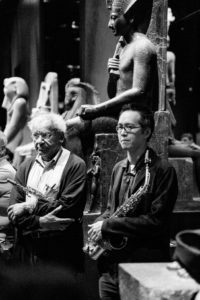
Anthony Braxton and James Fei in Torino. | Photo: Geoffroy Schied
Of all the artists performing this month at Edgefest, the annual festival of avant-garde jazz and creative new music October 19–22 at Kerrytown Concert House, Anthony Braxton may be the most challenging to describe succinctly.
Braxton first developed his skills in the revolutionary musical environment of Chicago during the 1960s. His first published recordings late in that decade evidenced a new creative voice, a virtuoso instrumentalist who could play all members of the saxophone, clarinet, and flute families with rigorous instrumental technique, and a vision grounded in both modernist classical and jazz traditions. His conceptual framework expanded time-honored terms of improvisation and composition and displayed the bravado to incorporate surprises like singing or whistling. At a time when many were reveling in completely free improvisation, unfettered by predetermined melodic or harmonic patterns, and others were still using traditional “theme and variation” avenues for improvised jazz solos, Braxton embraced both in his own way. His music deployed sound textures, time, and melodic transpositions using an idiosyncratic notational system and a catalog of devices such as trills or long notes that tells musicians to play in a specific manner or indicates a general manner of playing without dictating which notes to play. Other works use traditional notation or combine the two methods.
Over the decades, Braxton has expanded his musical vision in a disciplined way, exploring classical composition, African, Asian, and Native American music, poetry, and mythology, as well as the jazz tradition, defying standard artistic constraints in a style all his own. He has composed hundreds of pieces, including operas, works for large orchestras and for solo piano, and has worked with his own groups, primarily quartets and sextets, all while continuing to perform solo on alto saxophone. At the same time, he has developed complex philosophical ideas about vibrational history from what he describes as a “tri-centric perspective” (i.e., individual, community, and symbolic integration with the spiritual) requiring a restructuring of narrative systems. Braxton the revolutionary acknowledges that forms that started in the Romantic Period still have relevance to the present and to the future, and so has performed and recorded modern jazz standards, sometimes on the piano, including a massive CD collection of Charlie Parker tunes with British pianist Alexander Hawkins, who will be playing a solo set at the festival earlier in the day.
At Edgefest, Braxton will play saxophone in a duo with former student and keyboardist/electronics player James Fei, now a professor at Mills College where his mentor once taught. During this evening the duo will work with Braxton’s newest system, Lorraine, in which saxophone voices work in close contact, exploring not only melody and rhythm but also the rich sonic potentials of their instruments.
The same evening will also include works by Braxton performed by an ensemble led by U-M music professors Andrew Bishop and Marc Hannaford.